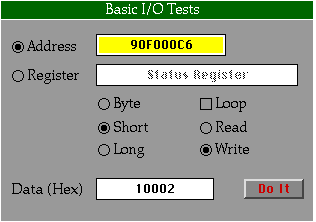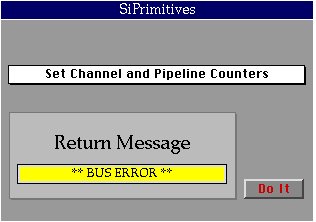SiTest Application
SiTest is a stand-alone application which allows the user to perform basic I/O tests of OnSiRoC controllers from a Macintosh computer. It also provides a user friendly interface from which to execute SiMac primitives. As with the SiMac library, SiTest assumes that the OnSiRoC has a pre-defined, fixed base address in VME.
Features
- VME I/O with 8-, 16- and 32-bit data.
- Menu-selectable OnSiRoC register offsets.
- SiMac primitives interface and execution.
- Loading sequencer & pedestal memories.
- Text file & raw data file conversion.
- Write events from OnSiRoC memories to files on the Mac.
- Planned:
- FTP facility to log events to other devices.
- Full pedestal --> FADC --> raw data calibration chain.
- Pattern editor for FADC calibration files (# successive pulses, amplitude etc.).
- Sequencer compiler/editor interface.
- Complete hardware tests and diagnostics.
Views
Basic I/O
The Basic I/O view allows direct I/O to OnSiRoC registers, or other VME memory locations. For convenience the OnSiRoC read/write registers are pre-defined and selectable in the menu labelled `Registers'. Offsets are added to the upper word of the address displayed in the `Address' editable text item, and so several OnSiRoCs may be addressed by simply editing the upper 16-bits of the address. For instance if the address of the first OnSiRoC in crate 1 as seen from a Mac with a micron card in slot d is `d0f00000', the 2nd OnSiRoC may be addressed by changing the address to `d0f10000'.

Other points of interest are:
- When reading or writing with the loop option set, exit by pressing the mouse button.
- The data box is only editable when the `write' option is selected.
- `Byte', `Short' and `Long' correspond to 8-bit, 16-bit and 32-bit data respectively.
- All values used are saved as defaults on exiting SiTest.
SiPrimitives
The SiPrimitives view allows SiMac routines to be run from the Macintosh. On selecting a routine, the user is prompted to change input parameters, and on exit, output arguments are displayed. Output arguments are not editable. Note that as with SiMac library routines, some returned arguments are to be ignored depending on the returned error code. For example if the returned error code is 0 (no error), the `address error' returned is non-sensical.

To use, select an OnsiRoC primitive from the pop-up menu, change the input parameters to the desired values, and press the `Do It' button to execute. Other points of interest are:
- If the Store address is a non-VME address, the user is prompted to Read/Write from/to a Macintosh file. Bear in mind the possible large data volumes involved in reading data from the OnSiRoCs.
- Only raw data files may be downloaded to the OnSiRoCs. These files are suffixed `.si'. Note that a file converting facility is also provided to change TEXT files to raw data format, and vice-versa. See below for more details. Files created by SiTest are raw data files, and to be viewed need to be converted to TEXT files.
- All values used are saved as defaults on exiting SiTest.
- As well as hexadecimal input values for setting the bias voltages, the user may also set the decimal value in the "Power Supplies" window. To select the window if it is not visible, select it from the `Window' menu.
File Formats
As mentioned above, only raw data files may be downloaded to the sequencer and pedestal memories. In fact these are the only kind which you should see in the `Open File' dialogue box. To convert a file from one format to another, use the Convert… option in the File menu. Whilst every effort is made not to over-write files, please ensure that naming conventions are not going to clash:
- Text files must be named filename.txt, and be of type `TEXT'. This means that MPW, TeachText, THINK C files are OK, but Microsoft Word files may not be (Word files are usually saved as formatted `Word Bundles (WDBN)'). Please ensure that there are no trailing spaces after the last data word! Text files which are converted to raw data files are named filename.si.
- Raw data files are named filename.si. They are converted to THINK C text files, but may be viewed with any text editor.